Top Trending Government News News & Highlights
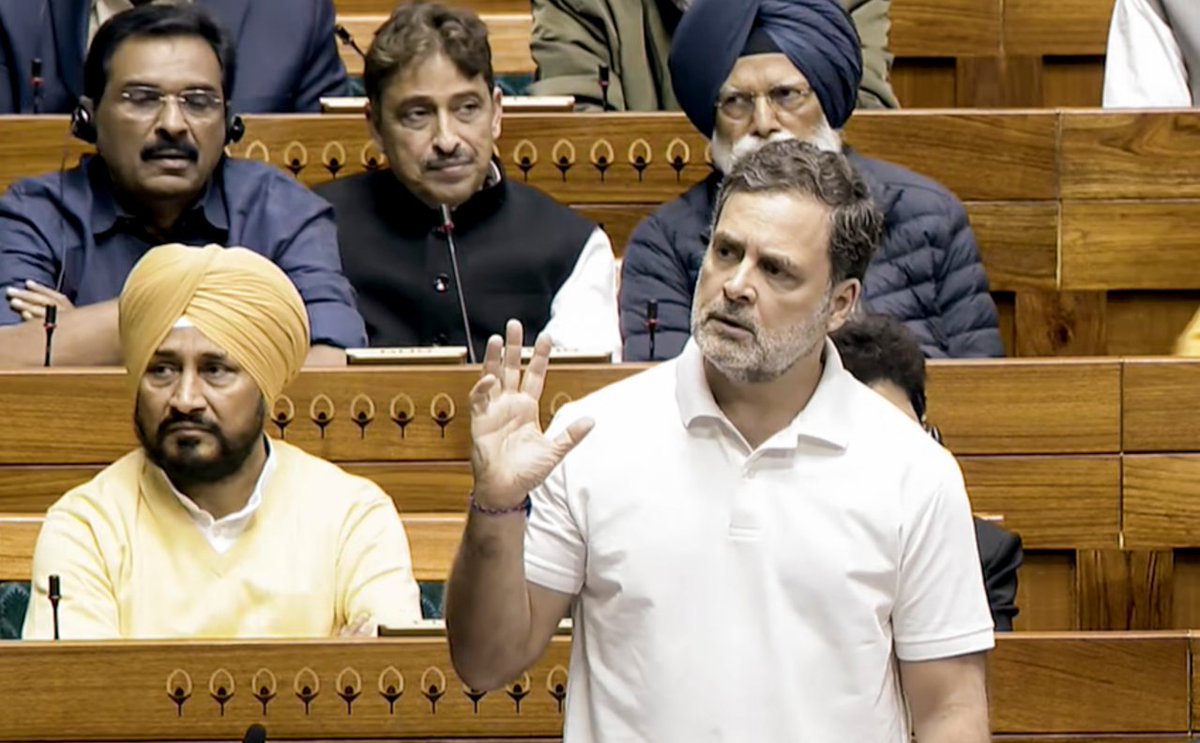

Don't you feel guilty about selling Bharat Mata Rahul Gandhi criticizes the US accord and the Center
Speaking in the Lok Sabha following days of deadlock, Rahul Gandhi criticized the Central government, led by Prime Minister Narendra Modi, for the recently concluded trade agreement with the United States, saying the administration should be embarrassed of it. In a vicious attack, Gandhi said that the Center "sold India" and that the government was endangering farmers' livelihoods by permitting US goods to enter."India is no longer yours. Do you not feel guilty for selling India? In reference to the trade deal, he declared, "You have sold our mother, Bharat Mata." He added that it was a "wholesale surrender" in which the interests of farmers were jeopardized and India's energy security was given to America. Gandhi went on to say that Donald Trump would have been advised to treat India equally if an INDIA Bloc administration had negotiated the trade deal with the US."This is total capitulation. The fact that it is a capitulation by more than simply the prime minister makes it tragic. He has given up the 1.5 billion Indians' future. Gandhi claimed that he had given up the future in order to save the BJP's financial structure, which is the subject of a case in the US.Gandhi claimed that the farmers' interests had been compromised and that they were facing a "storm" as American agricultural products flooded Indian markets. Additionally, he claimed that the Indian textile sector is "finished."We are about to enter a period of unrest, and the country has been sold. The country is sold out. "Its farmers and data have been sold," Gandhi reaffirmed as he wrapped up his remarks.Following Rahul Gandhi's address, Union Parliamentary Affairs Minister Kiren Rijiju declared that no one could sell India and charged that the Congress party was undermining the nation. "Congress is sad because India is progressing," he stated, asserting that Prime Minister Narendra Modi is India's strongest PM. He claimed that before leaving Parliament, the Congress MP gave speeches full of falsehoods and unfounded accusations. Rijiju remarked, "He never stays back to hear the minister's response."It is regrettable that we lack a serious personality or a person with a serious character that would be appropriate for the role of opposition leader. Rahul Gandhi's lies will be refuted by our party both within and outside the House.
Published 11 Feb 2026 11:10 PM
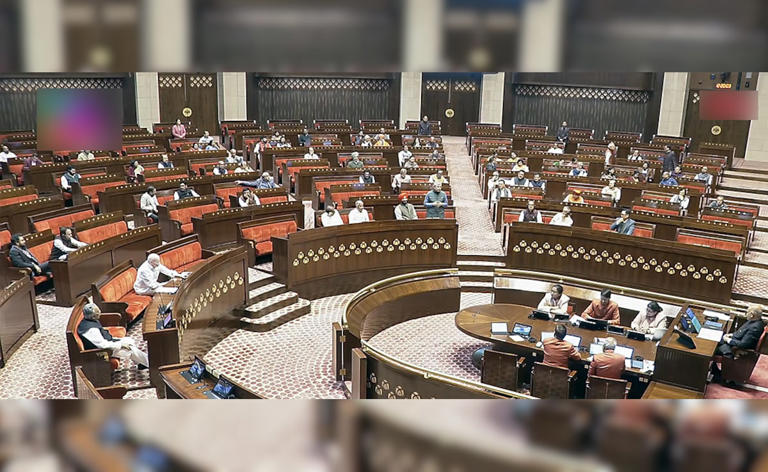

Updates for the 10th day of the Parliament Budget Session The Government-Opposition deadlock ends, and both Houses begin discussing the budget
The Lok Sabha began discussing the Union Budget on Tuesday, February 10, 2025, in the afternoon, signaling the end of the impasse between the opposition and treasury benches. The discussion had been delayed for days due to the opposition's insistence that LoP Rahul Gandhi be given the opportunity to speak on a number of topics. Following two adjournments, the House reconvened at 2 p.m., and the Speaker, Krishna Prasad Tenneti, invited Congressman Shashi Tharoor to commence the debate. The Thiruvananthapuram MP then began discussing the matter. Soon after opposition parties filed a notice to introduce a motion to oust Om Birla as Speaker of the Lok Sabha, the thaw occurred. Sukhendu Sekhar Roy of the Trinamool Congress emphasized that rising inequality could cause a "social upheaval," akin to what was seen in neighboring countries, as opposition parties criticized the government for failing to address issues like unemployment and inflation in the Union Budget during the budget discussion."If the situation is not brought under control, I fear that the country will soon experience social unrest similar to what has recently occurred in some of our neighboring countries. We have never witnessed such skyrocketing inequality between the rich, super rich, upper middle class, middle class, and the poor," Mr. Roy stated.
Published 11 Feb 2026 11:06 PM

India displays its entire armed might on the 77th Republic Day, with Operation Sindoor taking front stage on the Kartavya Path.
Top national leaders and prominent foreign visitors joined the festivities, which had as their subject 150 years of "Vande Mataram." About 10,000 distinguished guests saw the parade, which combined military might with cultural cohesion.At its 77th Republic Day parade on Monday, January 26, 2026, India put military might front and centre. Kartavya Path was transformed into a sweeping display of missiles, armour, mechanised columns, and combat aircraft, with a keen focus on weapon systems related to Operation Sindoor, the high-intensity military operation carried out in May of last year.The BrahMos supersonic cruise missile, Akash air defence system, Suryastra rocket launcher, and Arjun Main Battle Tank were among the major armament systems on exhibit at the start of the military demonstration, which emphasised India's focus on battlefield readiness and domestic defence manufacturing. A large portion of the equipment on exhibit was either used in Operation Sindoor, the confrontation with Pakistan that took place from May 7–10, or it was directly inspired by lessons learnt.A tri-services tableau featuring replicas of key weapon systems used during the operation was a big draw. A glass-cased integrated operational command centre served as its focal point, providing a visual representation of Operation Sindoor's execution through the coordinated use of systems including the S-400 air defence system and BrahMos. Akash and S-400 systems were depicted as offering a protective air-defense shield during the fight, while BrahMos missiles were predicted to perform decisive offensive attacks.Lt. General Bhavnish Kumar, a second-generation officer and General Officer Commanding, Delhi Area, led the procession. The Indian Army demonstrated a phased "Battle Array Format," including its airborne component, for the first time. The reconnaissance element included high-mobility reconnaissance vehicles after the historic 61 Cavalry in active battle uniform. Flying in Prahar formation, the domestic Dhruv Advanced Light Helicopter and its armed counterpart Rudra displayed aerial battlefield shaping.
Published 27 Jan 2026 09:07 PM
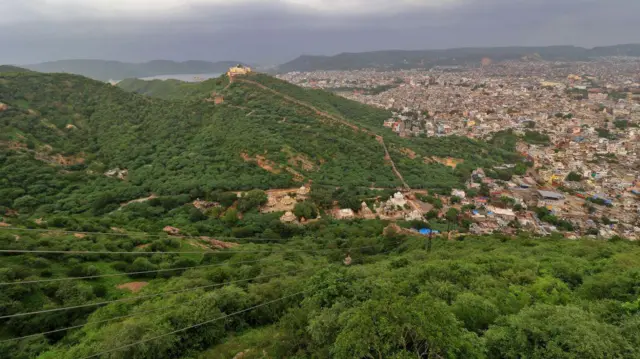

Why rising demonstrations are centered around India's Aravalli hills
The Supreme Court's redefinition of the Aravalli hills, one of the oldest geological formations in the world, which encompass the states of Rajasthan, Haryana, Gujarat, and Delhi, has sparked protests throughout northern India. Any landform rising at least 100 meters (328 feet) above the surrounding terrain is considered an Aravalli hill under the revised definition, which the court adopted in response to proposals from the federal government. An Aravalli range consists of two or more of these hills within 500 meters of one another, as well as the terrain in between. Environmentalists contend that classifying Aravalli hills according to height runs the risk of leaving many lower, scrub-covered but ecologically significant slopes vulnerable to mining and development. However, according to the federal government, the new definition is intended to increase uniformity and reinforce regulations rather than weaken rights.Protests have erupted across northern India after the Supreme Court redefined the Aravalli hills - one of the world's oldest geological formations spanning the states of Rajasthan, Haryana, Gujarat, and the capital, Delhi.
Published 22 Dec 2025 10:25 PM


Government News
Government News & Trends where we share you the latest updates under the government authorities globally starting from India to USA, China, Russia, Pakistan, UK and many more nations.


Rajya Sabha Polls Today: How Are Upper House Members Elected? Process Explained
The stage is set for crucial Rajya Sabha elections on Tuesday in which the ruling Bharatiya Janata Party (BJP) hopes to further increase its strength in the Upper House of Parliament.Out of 56 seats for which the Election Commission announced the poll schedule last month, as many as 41 including former Congress president Sonia Gandhi, BJP chief J P Nadda and new party entrant Ashok Chavan and Union ministers Ashwini Vaishnaw and L Murugan were elected unopposed while the polling on remaining 10 seats in Uttar Pradesh, 4 in Karnataka and 1 in Himachal Pradesh, Karnataka will take place on February 27. The official notification for these elections was issued on February 8, and the deadline for filing nominations was closed on February 15. The term of office for 50 Rajya Sabha MPs representing 13 states is slated to conclude on April 2, while the remaining six members from two states will complete their tenure on April 3. Among 56 seats, Uttar Pradesh has 10, Bihar and Maharashtra have six each, Madhya Pradesh and West Bengal have five each, Gujarat and Karnataka have four each, and Odisha, Andhra Pradesh, Telangana, and Rajasthan have three each. Additionally, Chhattisgarh, Haryana, Himachal Pradesh, and Uttarakhand each have one seat. The Rajya Sabha, also known as the Upper House of Parliament, takes inspiration from the United Kingdom’s House of Lords. Presently, it comprises 245 members, with 233 chosen through elections and 12 nominated. According to constitutional provisions, the Upper House’s membership is capped at 250. Out of the 233 elected members, representation is drawn from states and Union Territories (UTs), while the President of India appoints the remaining 12 individuals, who must demonstrate expertise in the realms of art, literature, science, and social services.


Bengal: Why Mamata Banerjee revived seat-sharing talks with Congress
After slamming the door hard in the Congress Party’s face, Chief Minister Mamata Banerjee-led Trinamool Congress has returned to the negotiating table to finalise a seat-sharing arrangement with the Grand Old Party in West Bengal, and importantly enough, in a few other states as well. Didi’s change of heart stems from a number of reasons linked to the national political scenario ahead of the announcement of dates for the general elections in mid-March. But the about-turn is, in many senses, a climb-down for the otherwise irrepressible Trinamool Congress which simply loves to punch above its weight and has acquired quite a reputation as a shrewd bargainer. The resumption of talks is, however, of great national importance before Lok Sabha polls as the Congress Party and the Trinamool Congress are the largest and second largest opposition party in the Indian National Developmental Inclusive Alliance bloc gearing up to take on the Bharatiya Janata Party-led National Democratic Alliance. Top leaders of the two parties, including the Congress Party’s Jairam Ramesh, have confirmed that talks have restarted and the doors for an alliance have reopened. A key reason for Mamata suddenly reopening talks with Rahul Gandhi’s party is Aam Aadmi Party leader and Delhi minister Atishi’s assertion at a press conference last week that Arvind Kejriwal will be arrested by the Central Bureau of Investigation or Enforcement Directorate this week unless AAP parts ways with the Congress Party and walks out of the Congress Party-led INDIA bloc to boost the NDA’s poll prospects. If the Trinamool Congress continued to disassociate itself from the Congress Party and refused to revive seat-sharing talks even after Atishi’s revelation that Kejriwal had received threats from the powers that be to choose between going to prison and walking out on the Congress Party, it would have been presumed in political circles that the Trinamool Congress had succumbed to exactly the same threats and dumped the Congress Party in order to shield Abhishek Banerjee, Mamata’s nephew and heir-apparent, who is facing a string of CBI and ED cases but hasn’t been arrested so far.
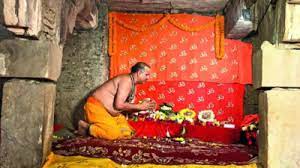

Todays ruling by the Allahabad High Court permits Hindus to offer prayers in the Gyanvapi Cellar
The Varanasi district court's decision to permit Hindu prayers in the Gyanvapi mosque's cellar was challenged in a petition that was dismissed by the Allahabad High Court today. On January 31, the district court in Varanasi made a ruling allowing a priest to lead prayers in the Gyanvapi mosque's southern cellar. Shailendra Kumar Pathak petitioned for the order to be granted, claiming that his maternal grandfather Somnath Vyas had offered prayers up until December 1993. Since he was a hereditary pujari, Mr. Pathak had asked to be permitted to return to the tahkhana and continue performing pooja. Within the mosque's basement are four 'tehkhanas' (cellars), one of which is still owned by the Vyas family.Following the release of an Archaeological Survey of India (ASI) report on the mosque complex, the Varanasi district court issued an order. According to the ASI survey, which the same court ordered in relation to a related case, the mosque was built over the ruins of a Hindu temple during Aurangzeb's reign. The petitioner's account was disputed by the mosque committee. The committee stated that since there were no idols in the cellar, prayers could not be said there until 1993.Within hours of the Supreme Court declining to hear the committee's appeal against the Varanasi district court order and requesting that it go to the high court, the committee went to the high court on February
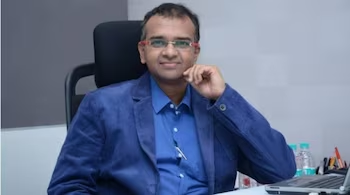

RBI, Govt support to fuel fintech firms growth: NPCI Chief Dilip Asbe
Asbe issued a caution to fintech founders regarding regulatory compliance, advising them to refrain from developing products that regulators have not explicitly authorised With backing from the government and the Reserve Bank of India (RBI), the fintech companies in India can expand their global footprint said Dilip Asbe, MD and CEO of the National Payments Corporation of India (NPCI). “Creating an acquiring footprint, creating value-added services over that, I think it is very logical for fintechs in India. I would be really surprised if we lose that game. With the clear thinking of the government and RBI, Indian fintechs will go global, as simple as that,” he said at Razorpay’s annual event in Bengaluru. He noted that Indian fintech companies must spearhead the task of elucidating the country’s payment standards to the global market before exporting them.He also noted the need for investment, saying that payment startups are well-funded. He acknowledged the dilemma faced by fintechs regarding balancing focus between domestic and global markets, given India’s substantial market size. Asbe issued a caution to fintech founders regarding regulatory compliance, advising them to refrain from developing products that regulators have not explicitly authorised.He emphasised that if a particular activity or product has not been explicitly approved, the default stance should be to abstain from pursuing it. “Whatever is not written in regulation means a no…When we are part of managing other people’s money, we should be responsible. Compliance is good and risks become higher with size, if fintech founders are here to build long-term, I don’t see it without compliance,” said Asbe. NPCI has also been pushing the lever on international expansion of UPI payments. The domestic service is currently live in countries including the United Arab Emirates (UAE) and Mauritius.
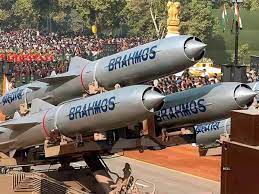

Govt clears Rs 31,000 cr defence orders
The contracts are likely to be signed in the current financial year and will come as a boost to the domestic defence manufacturing ecosystem. Sources said that the order for over 200 extended range Brahmos supersonic cruise missiles is valued at close to ₹20,000 crore. These missiles will be fitted onboard leading warships. The Brahmos missile is also being supplied to the Philippines.The CIWS system, the urgency for which has increased in recent times given the threat of unmanned aerial systems, is valued to close to ₹6,000 crore and, once signed, will be the largest single order to the Indian private sector. Defence manufacturing giant Larsen and Toubro has won the air force order and the systems will be manufactured indigenously. The government has cleared weapons acquisitions worth over ₹31,000 crore, including the single largest order ever to the Indian private sector. Approvals have been granted by the Cabinet Committee on Security (CCS) for purchase of Brahmos missiles and launchers for the navy and high powered radars and close in weapon systems (CIWS) for the Indian Air Force (IAF).


BJP was better than Congress but...: Shashi Tharoor predicts ruling partys downward slide in 2024 Lok Sabha polls
Ahead the Lok Sabha Elections 2024, Congress leader Shashi Tharoor explained where the Congress falls behind the Bharatiya Janata Party (BJP). Speaking at ABP Network's Ideas of India' Summit 3.0, he said on Friday the BJP has been better than the Congress "at the last mile of reaching every voter and knocking on doors, their panna prabhari system, etc. He said politics is about ideas, policies, and issues on one hand, and delivering them to the electorate in a way that gets out the results. "I agree that in the last couple of elections, the BJP has been better than Congress at the last mile of reaching every voter and knocking on doors, their panna prabhari system, etc. They have also been far better funded," he added. Speaking about the BJP, Tharoor said it would be difficult for the BJP to repeat its electoral performance of 2019. He said the BJP's performance peaked in 2019, in many states, and there would be only a "downward slide" in the coming elections. "The 'complacency' of the BJP is the opposition's strength," Shashi Tharoor was quoted by PTI as saying while speaking on 'Collaborative Federalism: View of the States'. Meanwhile, BJP MP Vinay Sahasrabuddhe, who was part of the panel, said the target for his party in the coming Lok Sabha polls was 370 seats. Tharoor responded by saying, ""They seem to think it is already a done deal and it isn't." He added that there was a great deal of scepticism about whether the BJP would be able to come anywhere close to what it was projecting. Tharoor further explained why he has doubts about the BJP achieving the 300+ target and said that in the 2019 elections, the BJP did "too well" across the Hindi heartland where it is strong. He said after the "wave of enthusiasm after the Ram mandir and so", the BJP's "percentage of votes may go up but there are no seats left to win at any of these places, and the story will vary from state to state". He noted that the BJP won every seat in Haryana, Rajasthan, all but one seat in Madhya Pradesh and Karnataka, and a large number of seats in West Bengal, Maharashtra and Bihar, Tharoor said. "The percentage of the BJP's votes may rise, but even if there is enthusiasm after the Ram Mandir consecration in Ayodhya, there are no more seats left to win in any of these places, and the story will vary from state to state," he said. "All of them is not possible this time, because it's impossible for them to repeat those numbers. I think they peaked in 2019. We are going to see nothing but a downward slide. How much downhill that is going to be depends on how effective the opposition campaign is, which is just picking up," the Congress leader said. The BJP's tally in the Lok Sabha rose to 303 in 2019. "All of this is not going to happen this time because it is impossible for them to repeat those numbers," Tharoor claimed. "The election hasn't been called yet so we don't know how much time the Opposition has... Don't give up on the Opposition as it could be your next government," Tharoor said. Unlock a world of Benefits! From insightful newsletters to real-time stock tracking, breaking news and a personalized newsfeed – it's all here, just a click away! Login Now!


Political Parties Should Find Solutions to Kashi, Mathura Outside Courts
Ajmer Dargah chief Syed Zainul Abedin said political parties should try to find solutions to disputes such as in Mathura and Kashi outside the courts. Any dispute that is resolved by mutual consent will win the hearts and trust of communities, he said.The Ajmer Dargah chief was addressing a conference titled “Paigam-e-Mohabbat Hum Sab Ka Bharat” organised by the Rajasthan unit of All India Sufi Sajjadanshin Council in which heads of almost all the dargahs of Rajasthan were present. Abedin said that India was playing a positive role in restoring peace in the world by following the civilization of Vasudhaiva Kutambakam, a statement issued here said.India is playing its role in world peace, so efforts should be made to resolve the internal issues of our country peacefully outside the courts All that is needed is a strong initiative,” he said. On the Citizenship Amendment Act, the Ajmer Dargah chief also said that in the last few years, Muslims have been misled about the CAA law.


Video: When PM Modi Stepped Into Gujarat Legislature As MLA For 1st Time
Rajkot will always have a very special place in my heart, said Prime Minister Narendra Modi today, sharing a throwback video of him campaigning for his first electoral battle in the city.The throwback video was shared by Modi Archive, a Twitter handle that narrates the life journey of the Prime Minister through archival photos, videos, and newspaper clips. On this day in 2002, PM Modi became a member of the Gujarat assembly for the first time, winning his first election from Rajkot. He was already sworn in as the Chief Minister of Gujarat the previous October and was required to become a member of the legislative assembly within six months to continue in the post. This Rajkot by-election gave him his opportunity. Sharing it, PM Modi said, "Rajkot will always have a very special place in my heart. It was the people of this city who put their faith in me, giving me my first-ever electoral win. Since then, I have always worked to do justice to the aspirations of the Janta Janardan." He also pointed out the "happy coincidence" that he is in Gujarat for two days, during which one of his programmes will be held in Rajkot. From here, five AIIMS will be dedicated to the nation, added the Prime Minister. The video is a montage of clips and images of him filing nomination, campaigning, and giving speeches in Rajkot.


Germany Votes To Legalise Cannabis But Theres A Catch
The German parliament voted Friday in favour of legalising the possession and controlled cultivation of cannabis starting in April, despite fierce objections from the opposition and campaign groups.Under the new law, it will be possible to obtain up to 25 grams of the drug per day for personal use through regulated cannabis cultivation associations, as well as to have up to three plants at home. However, possession and use of the drug would remain prohibited for anyone under 18.Ahead of the vote, Health Minister Karl Lauterbach called on members of parliament to back the controversial law, arguing that "the situation we are in now is in no way acceptable". Germany has seen a sharp rise in the number of young people using cannabis obtained on the black market, with no guarantees over the drug's composition, said Lauterbach, a member of Chancellor Olaf Scholz's Social Democrats. But Simone Borchardt of the opposition CDU said the new law would only increase health risks for young people, calling Lauterbach's assurances "no more than mere lip service".In their coalition agreement, the three parties had pledged to go further and allow cannabis to be sold in shops, only to be slapped down by the European Union. Borchardt accused the three parties in Scholz's coalition government of "making policy for their ideology and not for the country".The cannabis law has also been the subject of bitter wrangling within the coalition of Scholz's Social Democrats, the Greens and the liberal FDP. The new law has also been widely criticised by medical associations and health groups. The German public is divided on the issue: According to a YouGov poll published on Friday, 47 percent are in favour of the plan and 42 percent are against.


Steel PLI 2.0 put on hold at the moment, 5 cos start rolling out products under existing PLI scheme
The PLI 2.0 scheme for speciality steel has currently been put on hold, and proposals relating to it could be explored only after a review of the performance of the first phase, which is currently ongoing, senior officials of the Union Steel Ministry told businessline. The review will be carried out of the proposals that take place under PLI 1.0, including the time taken to roll out of products (under it) and the financial outgo, apart from market demand for new products, before any announcement on PLI 2.0 is made. Proposals could come under a new policy head too. PLI 2.0, which was targeting a disbursal of ₹4,300 – ₹4,500 crore, would cover segments like coated & plated steel, high strength and wear-resistant offerings, speciality rails, alloys including wires and tubes, electrical steel, among others. We do envisage that there will be interest in specialised steel making. But since these projects have long gestation period, and are high capex, a call has to be taken considering the change in market conditions in future. Right now, the focus would be on putting in place PLI 1.0 and ensure its roll out,” the official said adding: “So PLI 2.0 is on-hold at the moment.” In the case of PLI 1.0, MoUs have not been received in respect of 13 approved applications, and the official said that despite attempts these applicants have not been on-boarded for the ongoing scheme. Out of the 67 approved applications, 54 MoUs were inked. Drop-outs happened for various reasons that include changing demand patterns, high capex, environment clearances, and land litigation, because of absence of expertise in the segment, or also because clearances were granted in parts and not as a whole. Apart from India, steel demand, including that of specialised steel offerings, continues to remain depressed across key markets in Europe. There has been a drag–down effect by excess stocks in a slow-moving Chinese economy.
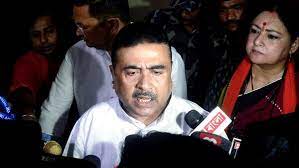

Khalistani’ slur row: BJPs Suvendu Adhikari dares Bengal Police to ‘prove charge in 24 hrs or face consequences’
Leader of opposition in the West Bengal assembly and Bharatiya Janata Party (BJP) leader Suvendu Adhikari on Tuesday challenged the state police to prove their charge that a 'Khalistani' slur was hurled at a Sikh police officer within 24 hours or face consequences. The IPS officer was deputed to prevent Adhikari from visiting the violence-stricken Sandeshkhali in North 24 Parganas district. Adhikari, along with another BJP leader Agnimitra Paul, had claimed that IPS officer Jaspreet Singh wasn't fulfilling his duties, but dismissed allegations that anyone from the party called him a 'Khalistani.' "No one has abused him or used the word 'Khalistani.' He is trying to make an issue," Paul claimed. Adhikari has also denied the allegations and accused the ruling Trinamool Congress (TMC) of diverting attention from development in Sandeshkhali, which had been witnessing protests after local women accused absconding TMC leader Shajahan Sheikh and his supporters of "sexually assaulting" them under coercion. The IPS officer, offended by the alleged comment, had questioned the BJP workers. "Just because I am wearing a turban, you people are calling me a Khalistani? Is this what you have learnt? If a police officer wears a turban and performs his duty honestly, he becomes a Khalistani for you? Shame on you," he had said.


Govt working on AI regulation framework, will be released by July 2024, says IT Minister Rajeev Chandrasekhar
"In short, by mid-2024, the government will have AI regulatory frameworks in place. AI will be used to improve farmer productivity, healthcare, agriculture, and the economy. The first draft of the long-awaited AI regulatory framework is anticipated in a few months. According to the state minister for electronics and information technology, the government is developing frameworks for regulations pertaining to AI, and they should be released in June or July of this year. According to Chandrasekhar, the Indian government intends to employ AI to achieve its objectives for economic growth. ""We plan to fully utilize AI to accomplish our economic growth objectives, guaranteeing a significant influence on healthcare, agriculture, and farmer productivity, among other areas,"" he stated in a post on X. This was stated by Chandrasekhar at the Mumbai Tech week. The government has been delaying the release of a framework for AI regulations for a long time. The IT Minister had stated plans to release the framework's initial draft as early as May 2023. But the same hasn't been made available yet. We should be able to view the initial draft of it within the next few months, according to Chandrasekhar's most recent remark. The Union Minister has stated multiple times how important and necessary the framework is, notwithstanding the delay. ""Amidst all the excitement about AI's potential to ""do more with less,"" there is also a rising conversation about its risks and drawbacks. Today's discussion centers on how to maximize AI's potential while minimizing its drawbacks mitigated?"" Chandrasekhar asked in a piece that appeared in India Today. ""A global governance framework that deals with safety and trust of AI is important, given the ubiquitous and boundary-agnostic nature of the Internet and AI,"" he continued. In the past, Chandrasekhar has also given a preview of what to anticipate from the AI framework. India's strategy entails formulating guidelines as well as an exhaustive inventory of AI-related injuries and crimes. India favors establishing explicit standards for platforms with an emphasis on addressing concerns like prejudice and misuse throughout model training, as opposed to regulating AI at particular stages of its development. The suggested approach entails outlining forbidden behaviors and enforcing penalties for noncompliance,"" he stated. "


“Back Door Linkage Between Party and Donors Was Possible”: Activist Lokesh Batra on Electoral Bonds
Chief Justice D.Y. Chandrachud, leading a five-judge bench, emphasised the significance of transparency in political funding, rejecting the government’s stance against disclosing such information. The ruling not only invalidated electoral bonds but also struck down related amendments to key laws. At the forefront of challenging the electoral bond scheme stands Commodore Lokesh Batra, a 76-year-old war veteran turned transparency activist. His relentless pursuit through the Right to Information (RTI) Act has exposed the opacity surrounding political funding, despite facing threats and intimidation. Batra’s scrutiny of the electoral bond scheme, initiated in 2017, led to over 80 RTI requests and a major expose in 2019, revealing the scheme’s flaws and the lack of accountability in political funding.
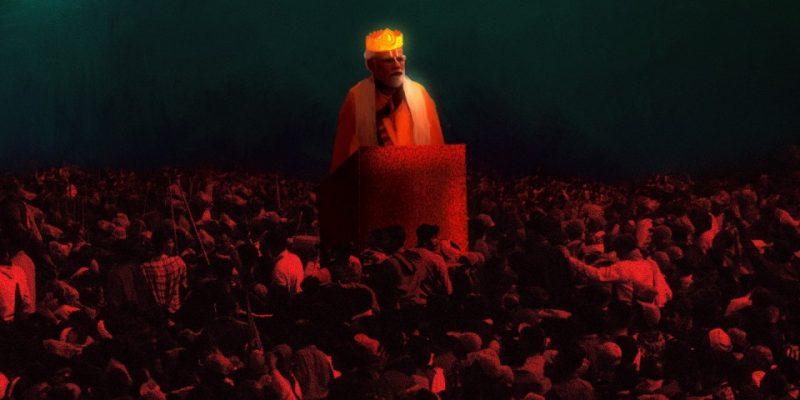

Of Bread and Circus: Roman Rajya in India
In a recent conversation on the state of affairs in India, I was educated about the ancient Roman politics of “bread and circus”. The Romans relied on skilfully curated distractions that kept the populace happy and distracted from the realities around them. The gladiators in the Colosseum and circus performances would keep the masses entertained while problems like hunger were taken care of by the state by ensuring a steady flow of grains and bread. Bread placated the public and kept their basic needs fulfilled, while the circus ensured that they were distracted from the dismal state of affairs around them.I utilise American journalist Alice Schroeder’s succinct and useful explanations of what the Roman system of bread and circus meant as a framework to make my case. While we are in the times of focusing on Ram Rajya, let us compare our current state with Roman Rajya. While we chest thump our way to being the 3rd largest economy globally, we are facing an ever-widening gap between the rich and the poor. On one hand, Indian businessmen and industrialists are climbing up on the global billionaire index while on the other, self-employed wages and regular wages have seen a negligible increase since 2017. The government has obfuscated this truth by clutching on to NITI Aayog’s Multi-Dimensional Poverty Index which claims that 25 million individuals have been lifted out of poverty in the past 9 years. Without any information on household consumption and savings, the government has hidden income-based indicators of poverty and is relying on this flawed, inaccurate and cherry-picked statistic. Manufacturing has reached historical lows under the Bharatiya Janata Party government (BJP). In 2022-23 it grew a dismal 1.3%. This is the second-lowest growth in the last 25 years. The only year worse than this was 2019-20, when the output declined by 3%. The focus is on the optics of being a manufacturing giant of smartphones, yet the devil is in the details. Wherein, government schemes have incentivised the exporting of phones from India, while ignoring incentivising value addition.
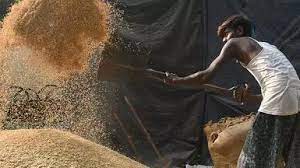

Former employees own 44 start-ups, eight backed by Binny Bansal
In the wee years of the millennium, two young former Amazon employees, Sachin Bansal and Binny Bansal, quit their jobs and founded their own e-commerce company Flipkart. The company grew by leaps and bounds and almost two decades later, a good number of Bansals’ former employees followed their paths, to start their ventures. Popularly referred to as ‘Flipkart Mafia’, Flipsters (former Flipkart employees) now own 44 start-ups, based on the data by PrivateCircle Research. However, these are only the companies about which information is available publicly and the real number could be higher. Data from the analytics platform YNOS venture engine, on the other hand, shows that of these 44 companies, eight are backed by Binny. These companies cumulatively have a valuation of $25 billion. Six of them are unicorns, with PhonePe being the company with the highest valuation - $12 billion. The other unicorns are Groww ($3 billion), Udaan ($1.75 billion), Spinny ($1.55 billion), cult.fit ($1.3 billion) and Slice ($1.3 billion), in that order. PrivateCircle’s data shows that the formation of new start-ups by Flipsters has a co-relation with the company’s ESOP buybacks. In December 2017, Flipkart bought back ESOPs worth over $100 million from over 3,000 current and former employees. In May 2018, American multinational Walmart acquired a majority stake in Flipkart. That year, the company exercised another ESOP buyback worth $500 million. The year 2018 also marked the creation of six start-ups by former Flipkart employees, the highest until then. In 2019, the company, yet again, exercised an ESOP buyback worth $100 million. In that year, eight start-ups were created by former Flipkart employees, the highest to date. Amid the pandemic, seven flipster-backed start-ups were incorporated in 2020. Four start-ups each were created in 2021 and 2022. In 2021, too, the company exercised an ESOP buyback.


Bharat Bandh today Noida, Delhi, Ghaziabad traffic and travel advisory to follow
Overview - With the announcement of a sectoral industrial strike and Gramin Bharat Bandh by workers and farmers, India is ready for a statewide protest on February 16. According to reports, there will be widespread blockages, or chakka jams, on important routes around the nation during the protest. Punjab will be the focal point of this, since most state and federal highways there are predicted to be closed for four hours. India is witnessing a statewide demonstration today, February 16, as farmers and laborers have declared a Gramin Bharat Bandh and a sectoral industrial strike. To take part in the daylong demonstration, farmer associations must band together, according to a demand made by the Samyukta Kisan Morcha, which speaks for farmers in a non-political capacity. There will be a nationwide strike from 6 a.m. to 4 p.m. According to reports, there will be widespread blockages, or chakka jams, on important routes around the nation during the protest. Punjab will be the focal point of this, since most state and federal highways there are predicted to be closed for four hours. Due to the Bharat Bandh organized by farmers' unions, the Gautam Buddh Nagar Police in Noida would implement restrictions, including CrPC Section 144, to prohibit illegal public gatherings throughout the region. The nationwide farmers' protest may cause traffic gridlock in Delhi as well.Thirty-four public intellectuals and artists have signed a joint statement endorsing the strike and calling on people of all backgrounds to support the farmers and workers. The significance of this "momentous action" is emphasized in the sentence. Emergency services including ambulance services, medical shops, and schools are likely to continue operating despite the interruption caused by the Bharat Bandh, guaranteeing minimum impact on essential services. Workers and farmers are uniting to draw attention to urgent issues and demand action from the government through the walkout and Bharat Bandh. The demonstration seeks to raise awareness of the difficulties experienced by these marginalized groups and to advocate for significant change with broad support and participation. The Samyukta Kisan Morcha (SKM) and central trade unions have called for a statewide Gramin Bharat Bandh in response to the treatment of farmers at the Haryana border. Tear gas was deployed by the Haryana police to break up the farmers' march. According to reports, the following are anticipated to be impacted by the Gramin Bharat Bandh: 1) National transportation 2) Stores in remote locations 3) Current MNREGA projects 4) Industrial projects in rural regions Private offices; 6) the service industry; 7) all aspects of agriculture.


57% vs 10%: BJP vs Congress share in electoral bond funds
In the six years since the electoral bonds scheme was introduced, more than half, or 57%, of the funds extended through bonds have gone to the BJP. The party, as per its declarations to the Election Commission, received Rs 5,271.97 crore via bonds between 2017-2022. The Congress was a distant second at Rs 952.29 crore. The EC is yet to publish the annual reports of parties for the financial year 2022-2023. The Supreme Court on Thursday held the changes made in the law to introduce the electoral bonds scheme as unconstitutional, in a unanimous verdict on a batch of pleas challenging the legal validity of the Centre’s scheme which allowed for anonymous funding to political parties. A five-judge Constitution Bench presided by Chief Justice of India D Y Chandrachud also directed that “the issuing bank shall herewith stop the issuance of electoral bonds” and asked the State Bank of India (SBI) to “submit details of the electoral bonds purchased since the interim order of the court dated April 12, 2019, till date to the Election Commission of India (ECI)”. The bench, also comprising Justices Sanjiv Khanna, B R Gavai, J B Pardiwala and Manoj Misra, said, “The deletion of the proviso to Section 182(1) of the Companies Act, permitting unlimited corporate funding to political parties is arbitrary and violative of Article 14”. Under the scheme, notified by the Narendra Modi government on January 2, 2018, electoral bonds could be purchased by any citizen of India or entity incorporated or established in India. An individual can buy electoral bonds, either singly or jointly with other individuals. It was pitched as an alternative to cash donations and as a way to increase transparency in political funding. In the period between 2017-2018 and 2021-2022, electoral bonds worth Rs 9,208.23 crore were sold, according to State Bank of India data obtained by The Indian Express through RTI.An analysis of the annual audited account statements submitted by the parties to the EC puts the worth of the contributions via bonds to the BJP at Rs 5,271.97 crore, from 2017-2018 till 2021-2022.
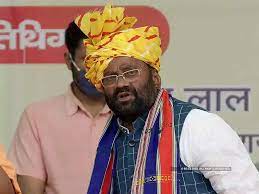

After Swami Maurya, SP’s Apna Dal ally speaks out over ‘sidelining’ of backwards
There is trouble brewing within the Samajwadi Party (SP), with dissenters using the latest round of rolling Rajya Sabha polls, due on February 27, as a platform to voice their disagreements with the party leadership. At least two prominent leaders of the party have questioned the SP’s “treatment” of backward leaders, with questions raised on why it had not stood by its own Lok Sabha poll promises regarding, what it calls, the PDA (Pichda, Dalit and Alpasankhyak) groups, while naming its Rajya Sabha candidates. The first was party national general secretary Swami Prasad Maurya, who resigned from his post on Tuesday, claiming that he was being undermined within the party by other leaders who described his statements as his “personal views”. Now Pallavi Patel, who won the Assembly seat from Sirathu in 2022 on the SP symbol, with her party Apna Dal (Kamervadi) as SP’s ally, has said she won’t cast her vote for the Rajya Sabha polls. The vote of the lone Apna Dal (K) leader could become crucial for the SP in getting all three of its nominees elected to the Rajya Sabha. Patel has objected to the fact that two of the three candidates nominated by the SP are not from PDA communities, and she suggested Wednesday that it was not certain that her party would continue as an SP ally. SP sources claimed her real grievance was that her mother Krishna Patel wasn’t nominated. SP chief Akhilesh Yadav, still recovering from the exit of ally RLD, asserted that there was no cause for worry. The SP, which can win 3 of the 10 Rajya Sabha seats from Uttar Pradesh that are falling vacant, has nominated former chief secretary Alok Ranjan, actor-turned-politician Jaya Bachchan — both Kayasths — and Ramji Lal Suman, a Dalit. Other party leaders too said on Wednesday that there was a difference between what SP chief Akhilesh Yadav is preaching and what he does. “To vindicate his PDA pitch, he should have sent three PDA people to the Rajya Sabha. He has sent Jaya Bachchan ji, who is a reliable leader for the SP. But was it the right choice in an election year? The second choice — Alok Ranjan — has raised more eyebrows within the party. He is from an upper caste, has no grounding in politics. The party leadership could have chosen a woman from a marginalised community. Maybe a Muslim woman and a backward class leader…,” a Lucknow-based SP leader said. Another SP leader said: “Look at what the BJP is doing. They have given Bharat Ratna to a farmer leader (Chaudhary Charan Singh) and a backward leader (Karpoori Thakur). This is all a part of their election strategy. Akhileshji and the top leadership could have also made the nominations a tactical move. The Muslims are a main vote bank for the SP now, but it seems they have no standing within the party.”



















